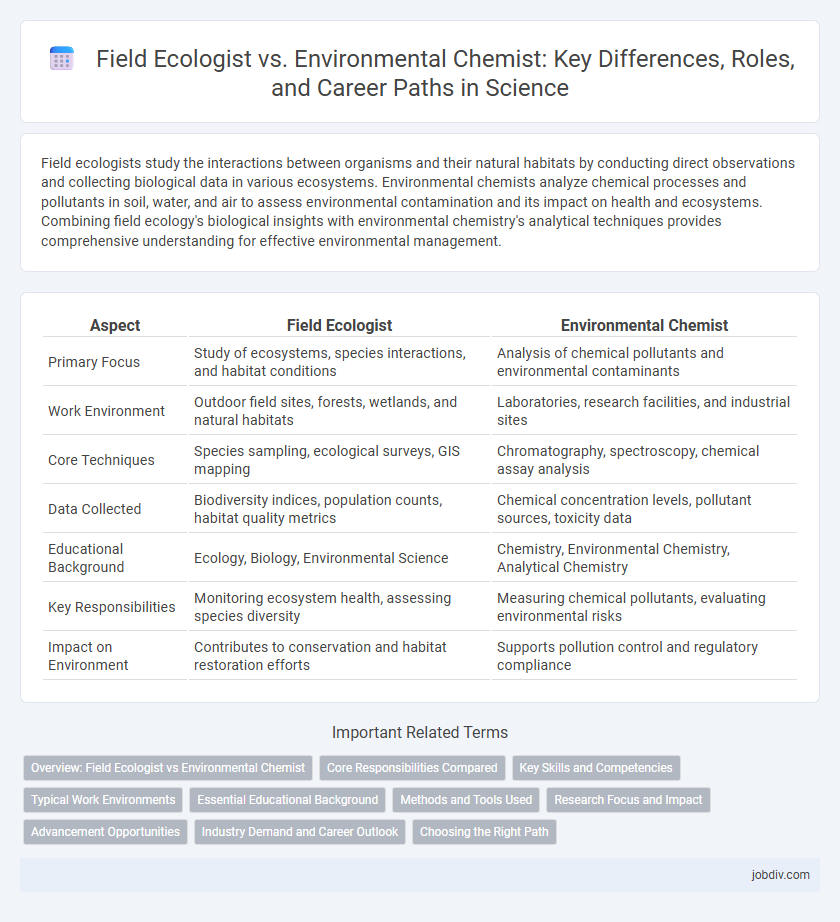Field ecologists study the interactions between organisms and their natural habitats by conducting direct observations and collecting biological data in various ecosystems. Environmental chemists analyze chemical processes and pollutants in soil, water, and air to assess environmental contamination and its impact on health and ecosystems. Combining field ecology's biological insights with environmental chemistry's analytical techniques provides comprehensive understanding for effective environmental management.
Table of Comparison
| Aspect | Field Ecologist | Environmental Chemist |
|---|---|---|
| Primary Focus | Study of ecosystems, species interactions, and habitat conditions | Analysis of chemical pollutants and environmental contaminants |
| Work Environment | Outdoor field sites, forests, wetlands, and natural habitats | Laboratories, research facilities, and industrial sites |
| Core Techniques | Species sampling, ecological surveys, GIS mapping | Chromatography, spectroscopy, chemical assay analysis |
| Data Collected | Biodiversity indices, population counts, habitat quality metrics | Chemical concentration levels, pollutant sources, toxicity data |
| Educational Background | Ecology, Biology, Environmental Science | Chemistry, Environmental Chemistry, Analytical Chemistry |
| Key Responsibilities | Monitoring ecosystem health, assessing species diversity | Measuring chemical pollutants, evaluating environmental risks |
| Impact on Environment | Contributes to conservation and habitat restoration efforts | Supports pollution control and regulatory compliance |
Overview: Field Ecologist vs Environmental Chemist
Field ecologists specialize in studying ecosystems and species interactions through direct observation and data collection in natural habitats, emphasizing biodiversity and habitat conservation. Environmental chemists analyze chemical processes and pollutants in soil, water, and air to assess environmental contamination and develop remediation strategies. Both professions contribute crucial insights to environmental science but differ in methodological focus--field ecologists prioritize ecological dynamics, while environmental chemists concentrate on chemical impacts and solutions.
Core Responsibilities Compared
Field Ecologists primarily focus on studying ecosystems, biodiversity, and wildlife interactions through in-situ data collection and habitat monitoring. Environmental Chemists analyze chemical pollutants in air, water, and soil to assess contamination levels and their impacts on environmental health. Both roles contribute critical insights for ecosystem management but differ in methods, with ecologists emphasizing biological assessments and chemists specializing in chemical analysis.
Key Skills and Competencies
Field Ecologists excel in skills such as species identification, habitat assessment, and data collection using GIS technology, emphasizing ecological monitoring and biodiversity analysis. Environmental Chemists specialize in analytical techniques like chromatography and spectroscopy to detect pollutants, coupled with a strong understanding of chemical reactions and environmental regulations. Both professions require proficiency in data analysis and critical thinking, but Field Ecologists prioritize fieldwork expertise while Environmental Chemists focus on laboratory-based chemical analysis.
Typical Work Environments
Field ecologists primarily conduct research in natural outdoor settings, such as forests, wetlands, and grasslands, where they collect samples and observe ecosystems directly. Environmental chemists often work in laboratories or industrial facilities, analyzing chemical compositions and pollutants in water, soil, and air samples. Both professions may collaborate with government agencies or environmental firms, but their typical work environments diverge significantly between field-based ecosystems and controlled indoor laboratories.
Essential Educational Background
Field ecologists require a strong foundation in biology, ecology, and environmental science, typically holding a bachelor's or master's degree in these disciplines to study ecosystems and biodiversity. Environmental chemists focus on chemistry, environmental science, and toxicology, often pursuing degrees in chemistry or environmental chemistry to analyze pollutants and chemical interactions in natural environments. Both fields emphasize interdisciplinary coursework, but field ecologists prioritize ecological and biological knowledge while environmental chemists concentrate on chemical analysis and laboratory skills.
Methods and Tools Used
Field ecologists primarily use observational techniques, geographic information systems (GIS), remote sensing, and in-situ sampling tools like quadrats and transects to study ecosystems and biodiversity. Environmental chemists employ analytical instruments such as gas chromatography-mass spectrometry (GC-MS), atomic absorption spectrometry (AAS), and high-performance liquid chromatography (HPLC) to detect and quantify chemical pollutants in soil, water, and air samples. Both disciplines utilize data loggers and statistical software for precise environmental monitoring and analysis, but their methodological focus diverges between biological assessment and chemical analysis.
Research Focus and Impact
Field ecologists primarily investigate ecosystem dynamics, species interactions, and biodiversity through direct observation and field experiments, providing vital data for conservation strategies. Environmental chemists analyze chemical pollutants and their transformations in air, water, and soil, contributing to pollution control and environmental remediation technologies. Both disciplines play critical roles in addressing ecological challenges, with field ecologists informing habitat management and environmental chemists driving regulatory standards for contaminant exposure.
Advancement Opportunities
Field ecologists often advance by leading large-scale ecosystem monitoring projects or transitioning into conservation program management, utilizing their expertise in biodiversity and habitat analysis. Environmental chemists progress through developing novel analytical techniques or assuming roles in regulatory compliance and environmental impact assessment, enhancing their proficiency in chemical risk evaluation and pollutant behavior. Both career paths benefit from interdisciplinary collaboration and continuous specialization, expanding their influence in environmental policy and sustainable resource management.
Industry Demand and Career Outlook
Field ecologists experience growing demand driven by global conservation efforts and biodiversity monitoring, with job opportunities concentrated in environmental consulting firms, government agencies, and non-profits. Environmental chemists face robust industry demand in sectors such as pollution control, regulatory compliance, and sustainable product development, supported by increasing environmental regulations worldwide. Career outlooks for both professions remain strong, with field ecologists emphasized in habitat restoration projects and environmental chemists sought after for their expertise in chemical analysis and environmental impact assessments.
Choosing the Right Path
Field ecologists specialize in studying ecosystems, biodiversity, and wildlife in natural habitats, using data collection techniques such as population surveys and habitat assessment. Environmental chemists analyze chemical processes and pollutants in air, water, and soil, focusing on contamination sources, chemical interactions, and remediation methods. Choosing the right path depends on whether one prefers hands-on ecological fieldwork and conservation or laboratory-based chemical analysis and environmental monitoring.
Field Ecologist vs Environmental Chemist Infographic

 jobdiv.com
jobdiv.com